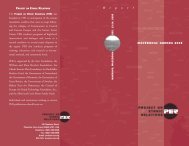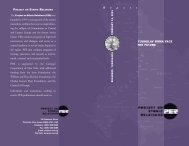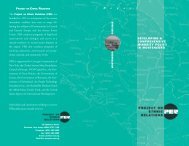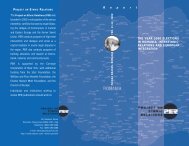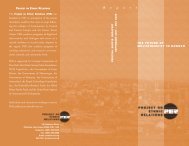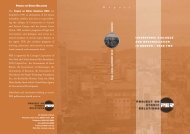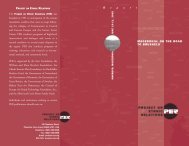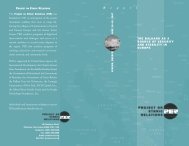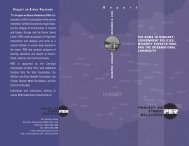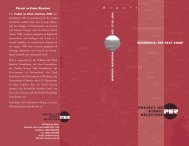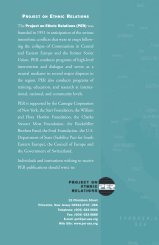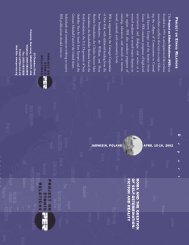expressed <str<strong>on</strong>g>the</str<strong>on</strong>g> hope that representatives of <str<strong>on</strong>g>the</str<strong>on</strong>g> Albanian populati<strong>on</strong> ofSouth Serbia would so<strong>on</strong> choose to participate <str<strong>on</strong>g>in</str<strong>on</strong>g> <str<strong>on</strong>g>the</str<strong>on</strong>g> <str<strong>on</strong>g>in</str<strong>on</strong>g>stituti<strong>on</strong>s of<str<strong>on</strong>g>the</str<strong>on</strong>g> Republic.This Serbian participant declared <str<strong>on</strong>g>the</str<strong>on</strong>g> upcom<str<strong>on</strong>g>in</str<strong>on</strong>g>g electi<strong>on</strong>s <str<strong>on</strong>g>in</str<strong>on</strong>g> Serbia(scheduled for January 21, 2007) will ensure <str<strong>on</strong>g>the</str<strong>on</strong>g> au<str<strong>on</strong>g>the</str<strong>on</strong>g>ntic representati<strong>on</strong>of ethnic m<str<strong>on</strong>g>in</str<strong>on</strong>g>orities <str<strong>on</strong>g>in</str<strong>on</strong>g> <str<strong>on</strong>g>the</str<strong>on</strong>g> Serbian parliament. He reported that <str<strong>on</strong>g>the</str<strong>on</strong>g>number of signatures required <strong>on</strong> petiti<strong>on</strong>s nom<str<strong>on</strong>g>in</str<strong>on</strong>g>at<str<strong>on</strong>g>in</str<strong>on</strong>g>g c<str<strong>on</strong>g>and</str<strong>on</strong>g>idates forethnic m<str<strong>on</strong>g>in</str<strong>on</strong>g>ority parties has been reduced to make it easier for c<str<strong>on</strong>g>and</str<strong>on</strong>g>idatesof ethnic parties to ga<str<strong>on</strong>g>in</str<strong>on</strong>g> a place <strong>on</strong> <str<strong>on</strong>g>the</str<strong>on</strong>g> ballot, <str<strong>on</strong>g>and</str<strong>on</strong>g> <str<strong>on</strong>g>the</str<strong>on</strong>g> electoral thresholdfor m<str<strong>on</strong>g>in</str<strong>on</strong>g>ority representati<strong>on</strong> has been lowered so as to guarantee <str<strong>on</strong>g>the</str<strong>on</strong>g> presenceof m<str<strong>on</strong>g>in</str<strong>on</strong>g>ority representatives <str<strong>on</strong>g>in</str<strong>on</strong>g> parliament.F<str<strong>on</strong>g>in</str<strong>on</strong>g>ally, this participant called for settlement of <str<strong>on</strong>g>the</str<strong>on</strong>g> status of Kosovo <strong>on</strong><str<strong>on</strong>g>the</str<strong>on</strong>g> basis of UN Security Council Resoluti<strong>on</strong> 1244, <str<strong>on</strong>g>and</str<strong>on</strong>g> <str<strong>on</strong>g>the</str<strong>on</strong>g> pr<str<strong>on</strong>g>in</str<strong>on</strong>g>ciple of <str<strong>on</strong>g>the</str<strong>on</strong>g>territorial <str<strong>on</strong>g>in</str<strong>on</strong>g>tegrity <str<strong>on</strong>g>and</str<strong>on</strong>g> sovereignty of Serbia. Such a settlement wouldrequire compromise. But, any soluti<strong>on</strong> that did not take <str<strong>on</strong>g>the</str<strong>on</strong>g>se pr<str<strong>on</strong>g>in</str<strong>on</strong>g>ciples<str<strong>on</strong>g>in</str<strong>on</strong>g>to account would not be acceptable to <str<strong>on</strong>g>the</str<strong>on</strong>g> government of Serbia.A politician from Republika Srpska (RS) <str<strong>on</strong>g>in</str<strong>on</strong>g> Bosnia-Herzegov<str<strong>on</strong>g>in</str<strong>on</strong>g>a reportedthat right-w<str<strong>on</strong>g>in</str<strong>on</strong>g>g forces were defeated <str<strong>on</strong>g>in</str<strong>on</strong>g> <str<strong>on</strong>g>the</str<strong>on</strong>g> last round of electi<strong>on</strong>s, <str<strong>on</strong>g>and</str<strong>on</strong>g>this has “calmed down radical elements” <str<strong>on</strong>g>in</str<strong>on</strong>g> <str<strong>on</strong>g>the</str<strong>on</strong>g> <str<strong>on</strong>g>in</str<strong>on</strong>g>fluential SerbianOrthodox Church. Yet, <str<strong>on</strong>g>in</str<strong>on</strong>g> <str<strong>on</strong>g>the</str<strong>on</strong>g> view of this participant, basic questi<strong>on</strong>s ofequality between <str<strong>on</strong>g>the</str<strong>on</strong>g> nati<strong>on</strong>s of Bosnia have not been resolved. “We triedto revise <str<strong>on</strong>g>the</str<strong>on</strong>g> c<strong>on</strong>stituti<strong>on</strong>, under str<strong>on</strong>g <str<strong>on</strong>g>in</str<strong>on</strong>g>ternati<strong>on</strong>al pressure, <str<strong>on</strong>g>and</str<strong>on</strong>g>agreed <strong>on</strong> a compromise. But that compromise could not w<str<strong>on</strong>g>in</str<strong>on</strong>g> a twothirdsmajority <str<strong>on</strong>g>in</str<strong>on</strong>g> parliament.” This participant argued “<str<strong>on</strong>g>the</str<strong>on</strong>g> House ofPeoples should c<strong>on</strong>trol vital nati<strong>on</strong>al <str<strong>on</strong>g>in</str<strong>on</strong>g>terests under <str<strong>on</strong>g>the</str<strong>on</strong>g> new c<strong>on</strong>stituti<strong>on</strong>,but this was not adopted.” Accord<str<strong>on</strong>g>in</str<strong>on</strong>g>g to this participant, “<str<strong>on</strong>g>the</str<strong>on</strong>g> Bosnjaksd<strong>on</strong>’t want entities. They want a highly centralized state. Serbs want topreserve <str<strong>on</strong>g>the</str<strong>on</strong>g> RS. Croats are dissatisfied with <str<strong>on</strong>g>the</str<strong>on</strong>g>ir representati<strong>on</strong> <str<strong>on</strong>g>in</str<strong>on</strong>g> <str<strong>on</strong>g>the</str<strong>on</strong>g>Federati<strong>on</strong> <str<strong>on</strong>g>and</str<strong>on</strong>g> <strong>on</strong> <str<strong>on</strong>g>the</str<strong>on</strong>g> nati<strong>on</strong>al level.” In argu<str<strong>on</strong>g>in</str<strong>on</strong>g>g for preservati<strong>on</strong> of <str<strong>on</strong>g>the</str<strong>on</strong>g>RS, this participant suggested “<str<strong>on</strong>g>the</str<strong>on</strong>g>re is proporti<strong>on</strong>al representati<strong>on</strong> ofethnic groups <str<strong>on</strong>g>in</str<strong>on</strong>g> <str<strong>on</strong>g>the</str<strong>on</strong>g> state adm<str<strong>on</strong>g>in</str<strong>on</strong>g>istrati<strong>on</strong>. The government [of RS] isnot exclusively Serb.” The ma<str<strong>on</strong>g>in</str<strong>on</strong>g> problem <str<strong>on</strong>g>in</str<strong>on</strong>g> Bosnia, accord<str<strong>on</strong>g>in</str<strong>on</strong>g>g to thisparticipant, is that “c<strong>on</strong>fidence <str<strong>on</strong>g>and</str<strong>on</strong>g> trust between ethnic groups has stillnot been restored.” Many people hold “negative images of <str<strong>on</strong>g>the</str<strong>on</strong>g> ‘o<str<strong>on</strong>g>the</str<strong>on</strong>g>r’ asthose who were ‘<strong>on</strong> <str<strong>on</strong>g>the</str<strong>on</strong>g> o<str<strong>on</strong>g>the</str<strong>on</strong>g>r side of <str<strong>on</strong>g>the</str<strong>on</strong>g> fr<strong>on</strong>t l<str<strong>on</strong>g>in</str<strong>on</strong>g>es’.” This participantsuggested that <str<strong>on</strong>g>the</str<strong>on</strong>g> soluti<strong>on</strong> to <str<strong>on</strong>g>the</str<strong>on</strong>g>se <str<strong>on</strong>g>and</str<strong>on</strong>g> o<str<strong>on</strong>g>the</str<strong>on</strong>g>r problems <str<strong>on</strong>g>in</str<strong>on</strong>g> Bosnia was<str<strong>on</strong>g>in</str<strong>on</strong>g>tegrati<strong>on</strong> of Bosnia Herzegov<str<strong>on</strong>g>in</str<strong>on</strong>g>a <str<strong>on</strong>g>in</str<strong>on</strong>g>to <str<strong>on</strong>g>the</str<strong>on</strong>g> EU.This participant suggested that determ<str<strong>on</strong>g>in</str<strong>on</strong>g>ati<strong>on</strong> of <str<strong>on</strong>g>the</str<strong>on</strong>g> future status ofKosovo would have important c<strong>on</strong>sequences for Bosnia. “Politicians <str<strong>on</strong>g>in</str<strong>on</strong>g><str<strong>on</strong>g>the</str<strong>on</strong>g> RS are frequently asked not to menti<strong>on</strong> Kosovo at all,” he reported.“But people <str<strong>on</strong>g>in</str<strong>on</strong>g> <str<strong>on</strong>g>the</str<strong>on</strong>g> RS are follow<str<strong>on</strong>g>in</str<strong>on</strong>g>g <str<strong>on</strong>g>the</str<strong>on</strong>g> dialogue <strong>on</strong> Kosovo more closelythan <str<strong>on</strong>g>the</str<strong>on</strong>g>y are follow<str<strong>on</strong>g>in</str<strong>on</strong>g>g what is go<str<strong>on</strong>g>in</str<strong>on</strong>g>g <strong>on</strong> <str<strong>on</strong>g>in</str<strong>on</strong>g>side Bosnia. People seeKosovo as a vital issue,” <str<strong>on</strong>g>and</str<strong>on</strong>g> <str<strong>on</strong>g>the</str<strong>on</strong>g>y view it “emoti<strong>on</strong>ally.” He warned that“without <str<strong>on</strong>g>the</str<strong>on</strong>g> c<strong>on</strong>sent, or c<strong>on</strong>sensus of people <str<strong>on</strong>g>in</str<strong>on</strong>g> Serbia <str<strong>on</strong>g>and</str<strong>on</strong>g> Kosovo, <str<strong>on</strong>g>the</str<strong>on</strong>g>recannot be a stable soluti<strong>on</strong>.” He c<strong>on</strong>trasted “imposed partiti<strong>on</strong> <str<strong>on</strong>g>in</str<strong>on</strong>g>Kosovo” to “imposed unity <str<strong>on</strong>g>in</str<strong>on</strong>g> Bosnia,” <str<strong>on</strong>g>and</str<strong>on</strong>g> cauti<strong>on</strong>ed “an imposed soluti<strong>on</strong>will cause problems. People will ask how is it possible to have <str<strong>on</strong>g>in</str<strong>on</strong>g>dependencefor Kosovo <str<strong>on</strong>g>and</str<strong>on</strong>g> not have <str<strong>on</strong>g>in</str<strong>on</strong>g>dependence for <str<strong>on</strong>g>the</str<strong>on</strong>g> RS?” He stated that“no <strong>on</strong>e will take up weap<strong>on</strong>s,” but he warned “<str<strong>on</strong>g>the</str<strong>on</strong>g>re will be widespreadfeel<str<strong>on</strong>g>in</str<strong>on</strong>g>gs of frustrati<strong>on</strong> if <str<strong>on</strong>g>the</str<strong>on</strong>g>re is imposed <str<strong>on</strong>g>in</str<strong>on</strong>g>dependence for Kosovo.”Ano<str<strong>on</strong>g>the</str<strong>on</strong>g>r participant from Bosnia began his remarks by stipulat<str<strong>on</strong>g>in</str<strong>on</strong>g>g thathis was not “ano<str<strong>on</strong>g>the</str<strong>on</strong>g>r’ or “different” voice from Bosnia, not an oppos<str<strong>on</strong>g>in</str<strong>on</strong>g>gvoice. He wanted to be heard as <strong>on</strong>ly “<strong>on</strong>e more” voice. He firstaddressed <str<strong>on</strong>g>the</str<strong>on</strong>g> issue of territorializati<strong>on</strong> of ethnic identity, reject<str<strong>on</strong>g>in</str<strong>on</strong>g>g it as alast<str<strong>on</strong>g>in</str<strong>on</strong>g>g soluti<strong>on</strong> to <str<strong>on</strong>g>in</str<strong>on</strong>g>terethnic relati<strong>on</strong>s. He agreed <str<strong>on</strong>g>the</str<strong>on</strong>g> <strong>on</strong>ly soluti<strong>on</strong> for<str<strong>on</strong>g>the</str<strong>on</strong>g> Balkan regi<strong>on</strong> is <str<strong>on</strong>g>in</str<strong>on</strong>g>tegrati<strong>on</strong> of <str<strong>on</strong>g>the</str<strong>on</strong>g> whole regi<strong>on</strong> <str<strong>on</strong>g>in</str<strong>on</strong>g>to <str<strong>on</strong>g>the</str<strong>on</strong>g> EuropeanUni<strong>on</strong>. He reported <str<strong>on</strong>g>the</str<strong>on</strong>g> number of “serious” central state <str<strong>on</strong>g>in</str<strong>on</strong>g>stituti<strong>on</strong>s <str<strong>on</strong>g>in</str<strong>on</strong>g>Bosnia has <str<strong>on</strong>g>in</str<strong>on</strong>g>creased c<strong>on</strong>siderably s<str<strong>on</strong>g>in</str<strong>on</strong>g>ce <str<strong>on</strong>g>the</str<strong>on</strong>g> Dayt<strong>on</strong> Accord. This developmentof comm<strong>on</strong> state <str<strong>on</strong>g>in</str<strong>on</strong>g>stituti<strong>on</strong>s, he declared, was accomplishedwith <str<strong>on</strong>g>the</str<strong>on</strong>g> full agreement of both entities <str<strong>on</strong>g>and</str<strong>on</strong>g> all three nati<strong>on</strong>s. “The viewof Bosnia as a state <str<strong>on</strong>g>in</str<strong>on</strong>g> which <str<strong>on</strong>g>in</str<strong>on</strong>g>ternal differences mean noth<str<strong>on</strong>g>in</str<strong>on</strong>g>g gets d<strong>on</strong>ewithout direct <str<strong>on</strong>g>in</str<strong>on</strong>g>terventi<strong>on</strong> by <str<strong>on</strong>g>the</str<strong>on</strong>g> <str<strong>on</strong>g>in</str<strong>on</strong>g>ternati<strong>on</strong>al community is no l<strong>on</strong>gercorrect,” he argued. He reported <str<strong>on</strong>g>the</str<strong>on</strong>g> requirements of EU accessi<strong>on</strong> haveled Bosnia to adopt 45 new laws <str<strong>on</strong>g>and</str<strong>on</strong>g> to establish 27 new comm<strong>on</strong><str<strong>on</strong>g>in</str<strong>on</strong>g>stituti<strong>on</strong>s. But <str<strong>on</strong>g>the</str<strong>on</strong>g>se acti<strong>on</strong>s, he <str<strong>on</strong>g>in</str<strong>on</strong>g>sisted, were not undertaken solelybecause of EU pressure. They were undertaken because <str<strong>on</strong>g>the</str<strong>on</strong>g>y servedBosnian self-<str<strong>on</strong>g>in</str<strong>on</strong>g>terest. “The capacity of <str<strong>on</strong>g>the</str<strong>on</strong>g> Bosnian state to act has notreceived appropriate recogniti<strong>on</strong>,” he declared. He anticipated that byJune significant progress toward accessi<strong>on</strong> will be achieved, <str<strong>on</strong>g>the</str<strong>on</strong>g> office of<str<strong>on</strong>g>the</str<strong>on</strong>g> High Commissi<strong>on</strong>er will have been elim<str<strong>on</strong>g>in</str<strong>on</strong>g>ated, <str<strong>on</strong>g>and</str<strong>on</strong>g> <str<strong>on</strong>g>the</str<strong>on</strong>g> “Dayt<strong>on</strong>phase” of Bosnian development will give way to a “Brussels phase.”A participant from M<strong>on</strong>tenegro suggested his country was a good exampleof a multiethnic state that had c<strong>on</strong>formed to European dem<str<strong>on</strong>g>and</str<strong>on</strong>g>s. Heattributed at least part of <str<strong>on</strong>g>the</str<strong>on</strong>g> <str<strong>on</strong>g>in</str<strong>on</strong>g>ternal oppositi<strong>on</strong> to <str<strong>on</strong>g>in</str<strong>on</strong>g>dependence to“xenophobic, c<strong>on</strong>servative, <str<strong>on</strong>g>and</str<strong>on</strong>g> nati<strong>on</strong>alistic” attitudes am<strong>on</strong>g some people.1213
N<strong>on</strong>e<str<strong>on</strong>g>the</str<strong>on</strong>g>less, he affirmed that <str<strong>on</strong>g>the</str<strong>on</strong>g> <str<strong>on</strong>g>in</str<strong>on</strong>g>dependent state of M<strong>on</strong>tenegrowould c<strong>on</strong>t<str<strong>on</strong>g>in</str<strong>on</strong>g>ue to pursue <str<strong>on</strong>g>in</str<strong>on</strong>g>terethnic harm<strong>on</strong>y. He cited <str<strong>on</strong>g>the</str<strong>on</strong>g> support ofethnic m<str<strong>on</strong>g>in</str<strong>on</strong>g>orities for <str<strong>on</strong>g>in</str<strong>on</strong>g>dependence <str<strong>on</strong>g>in</str<strong>on</strong>g> <str<strong>on</strong>g>the</str<strong>on</strong>g> recent referendum, criticizedby <str<strong>on</strong>g>the</str<strong>on</strong>g> nati<strong>on</strong>alistic oppositi<strong>on</strong> who suggest <str<strong>on</strong>g>in</str<strong>on</strong>g>dependence was w<strong>on</strong> by“m<str<strong>on</strong>g>in</str<strong>on</strong>g>orities” <str<strong>on</strong>g>and</str<strong>on</strong>g> not <str<strong>on</strong>g>the</str<strong>on</strong>g> “majority,” as evidence of <str<strong>on</strong>g>the</str<strong>on</strong>g> good <str<strong>on</strong>g>in</str<strong>on</strong>g>terethnicrelati<strong>on</strong>s already established <str<strong>on</strong>g>in</str<strong>on</strong>g> <str<strong>on</strong>g>the</str<strong>on</strong>g> country.A participant from Albania emphasized <str<strong>on</strong>g>the</str<strong>on</strong>g> importance of fulfill<str<strong>on</strong>g>in</str<strong>on</strong>g>g <str<strong>on</strong>g>the</str<strong>on</strong>g>requirements of her country’s stabilizati<strong>on</strong>/associati<strong>on</strong> agreement with<str<strong>on</strong>g>the</str<strong>on</strong>g> EU as a prec<strong>on</strong>diti<strong>on</strong> for accessi<strong>on</strong>. In c<strong>on</strong>necti<strong>on</strong> with this, sheunderscored her government’s “zero tolerance” for organized crime, asthis is a major obstacle not <strong>on</strong>ly to accessi<strong>on</strong>, but to establishment of <str<strong>on</strong>g>the</str<strong>on</strong>g>rule of law. The most important issue for citizens, however, is improv<str<strong>on</strong>g>in</str<strong>on</strong>g>g<str<strong>on</strong>g>the</str<strong>on</strong>g> st<str<strong>on</strong>g>and</str<strong>on</strong>g>ard of liv<str<strong>on</strong>g>in</str<strong>on</strong>g>g <str<strong>on</strong>g>in</str<strong>on</strong>g> Albania, which ultimately requires c<strong>on</strong>t<str<strong>on</strong>g>in</str<strong>on</strong>g>uedec<strong>on</strong>omic development.A politician from South Serbia suggested that <str<strong>on</strong>g>the</str<strong>on</strong>g> implementati<strong>on</strong> of <str<strong>on</strong>g>the</str<strong>on</strong>g>agreement end<str<strong>on</strong>g>in</str<strong>on</strong>g>g c<strong>on</strong>flict <str<strong>on</strong>g>in</str<strong>on</strong>g> that regi<strong>on</strong> had, <str<strong>on</strong>g>in</str<strong>on</strong>g> his view, produced nopositive results. On <str<strong>on</strong>g>the</str<strong>on</strong>g> c<strong>on</strong>trary, he argued, “<str<strong>on</strong>g>the</str<strong>on</strong>g>re is c<strong>on</strong>t<str<strong>on</strong>g>in</str<strong>on</strong>g>u<str<strong>on</strong>g>in</str<strong>on</strong>g>g pressurefrom <str<strong>on</strong>g>the</str<strong>on</strong>g> Serbian police.” He supported <str<strong>on</strong>g>the</str<strong>on</strong>g> view that m<str<strong>on</strong>g>in</str<strong>on</strong>g>orities shouldenjoy collective rights, <str<strong>on</strong>g>and</str<strong>on</strong>g> called for <str<strong>on</strong>g>the</str<strong>on</strong>g> regi<strong>on</strong>alizati<strong>on</strong> of Serbia, <str<strong>on</strong>g>and</str<strong>on</strong>g><str<strong>on</strong>g>the</str<strong>on</strong>g> establishment of regi<strong>on</strong>s that respect ethnic identities. He cited<str<strong>on</strong>g>in</str<strong>on</strong>g>terethnic agreements <str<strong>on</strong>g>in</str<strong>on</strong>g> M<strong>on</strong>tenegro as a model for resolv<str<strong>on</strong>g>in</str<strong>on</strong>g>g problems<str<strong>on</strong>g>in</str<strong>on</strong>g> Serbia. But he added “<str<strong>on</strong>g>the</str<strong>on</strong>g> Presevo valley must have special status,special treatment <str<strong>on</strong>g>in</str<strong>on</strong>g>side of Serbia.”Ano<str<strong>on</strong>g>the</str<strong>on</strong>g>r participant from Serbia argued that significant progress hasbeen achieved <str<strong>on</strong>g>in</str<strong>on</strong>g> South Serbia. But he suggested that for <str<strong>on</strong>g>the</str<strong>on</strong>g> past threeyears <str<strong>on</strong>g>the</str<strong>on</strong>g> Albanian m<str<strong>on</strong>g>in</str<strong>on</strong>g>ority <str<strong>on</strong>g>the</str<strong>on</strong>g>re has not been will<str<strong>on</strong>g>in</str<strong>on</strong>g>g to make use of all<str<strong>on</strong>g>the</str<strong>on</strong>g> rights it enjoys under Serbian law. Serbian law “gives sufficientroom,” he argued, <str<strong>on</strong>g>in</str<strong>on</strong>g> such areas as culture, educati<strong>on</strong>, <str<strong>on</strong>g>and</str<strong>on</strong>g> <str<strong>on</strong>g>the</str<strong>on</strong>g> media. Itwas not until very recently that <str<strong>on</strong>g>the</str<strong>on</strong>g> Albanian m<str<strong>on</strong>g>in</str<strong>on</strong>g>ority <str<strong>on</strong>g>in</str<strong>on</strong>g> <str<strong>on</strong>g>the</str<strong>on</strong>g> regi<strong>on</strong> waswill<str<strong>on</strong>g>in</str<strong>on</strong>g>g to set up a nati<strong>on</strong>al council of its own, as 14 o<str<strong>on</strong>g>the</str<strong>on</strong>g>r m<str<strong>on</strong>g>in</str<strong>on</strong>g>oritieshave already d<strong>on</strong>e <str<strong>on</strong>g>in</str<strong>on</strong>g> Serbia, which would enable <str<strong>on</strong>g>the</str<strong>on</strong>g> Albanian nati<strong>on</strong>alm<str<strong>on</strong>g>in</str<strong>on</strong>g>ority to exercise such rights.An <str<strong>on</strong>g>in</str<strong>on</strong>g>ternati<strong>on</strong>al participant asked “what have been <str<strong>on</strong>g>the</str<strong>on</strong>g> <str<strong>on</strong>g>in</str<strong>on</strong>g>centives forthose m<str<strong>on</strong>g>in</str<strong>on</strong>g>ority representatives who have cooperated <str<strong>on</strong>g>in</str<strong>on</strong>g> <str<strong>on</strong>g>the</str<strong>on</strong>g> effort to builddemocratic <str<strong>on</strong>g>in</str<strong>on</strong>g>stituti<strong>on</strong>s <str<strong>on</strong>g>in</str<strong>on</strong>g> <str<strong>on</strong>g>the</str<strong>on</strong>g>ir countries?” And, he asked “why havethose who cooperated with majorities, <str<strong>on</strong>g>and</str<strong>on</strong>g> w<strong>on</strong> c<strong>on</strong>cessi<strong>on</strong>s for <str<strong>on</strong>g>the</str<strong>on</strong>g>irpeople, still lost political power?” This regi<strong>on</strong>-wide pattern might leadsome to c<strong>on</strong>clude that exist<str<strong>on</strong>g>in</str<strong>on</strong>g>g <str<strong>on</strong>g>in</str<strong>on</strong>g>centives to cooperate are <str<strong>on</strong>g>in</str<strong>on</strong>g>sufficient if<str<strong>on</strong>g>the</str<strong>on</strong>g>se politicians risk <str<strong>on</strong>g>the</str<strong>on</strong>g> loss of power. “Is <str<strong>on</strong>g>the</str<strong>on</strong>g> hope of membership <str<strong>on</strong>g>in</str<strong>on</strong>g> <str<strong>on</strong>g>the</str<strong>on</strong>g>EU still a str<strong>on</strong>g enough <str<strong>on</strong>g>in</str<strong>on</strong>g>centive,” he asked, especially <str<strong>on</strong>g>in</str<strong>on</strong>g> light of recentchanges <str<strong>on</strong>g>in</str<strong>on</strong>g> public op<str<strong>on</strong>g>in</str<strong>on</strong>g>i<strong>on</strong> <str<strong>on</strong>g>and</str<strong>on</strong>g> official rhetoric <str<strong>on</strong>g>in</str<strong>on</strong>g> <str<strong>on</strong>g>the</str<strong>on</strong>g> EU? These questi<strong>on</strong>srema<str<strong>on</strong>g>in</str<strong>on</strong>g>ed unanswered.Ano<str<strong>on</strong>g>the</str<strong>on</strong>g>r <str<strong>on</strong>g>in</str<strong>on</strong>g>ternati<strong>on</strong>al participant noted that “<str<strong>on</strong>g>the</str<strong>on</strong>g>re is noth<str<strong>on</strong>g>in</str<strong>on</strong>g>g <str<strong>on</strong>g>in</str<strong>on</strong>g> <str<strong>on</strong>g>the</str<strong>on</strong>g> acquiscommunautaire about ethnic m<str<strong>on</strong>g>in</str<strong>on</strong>g>orities.” EU <str<strong>on</strong>g>in</str<strong>on</strong>g>sistence <strong>on</strong> resoluti<strong>on</strong>of <str<strong>on</strong>g>in</str<strong>on</strong>g>terethnic issues is “part of c<strong>on</strong>diti<strong>on</strong>ality for accessi<strong>on</strong>. The EU willnot import problems,” he warned. He suggested that “<str<strong>on</strong>g>the</str<strong>on</strong>g> promise ofliv<str<strong>on</strong>g>in</str<strong>on</strong>g>g <str<strong>on</strong>g>in</str<strong>on</strong>g> an <str<strong>on</strong>g>in</str<strong>on</strong>g>tegrated regi<strong>on</strong> without obstacles to travel, movement,or employment should be especially significant for groups dividedam<strong>on</strong>g several states.” He later declared “after Kosovo, <str<strong>on</strong>g>the</str<strong>on</strong>g> territorialorganizati<strong>on</strong> of <str<strong>on</strong>g>the</str<strong>on</strong>g> whole regi<strong>on</strong> will be set, <str<strong>on</strong>g>and</str<strong>on</strong>g> all governments will berequired to endorse this.”BUILDING A DEMOCRATIC ANDMULTIETHNIC KOSOVOA politician from Kosovo opened <str<strong>on</strong>g>the</str<strong>on</strong>g> discussi<strong>on</strong> of <str<strong>on</strong>g>the</str<strong>on</strong>g> challenges of build<str<strong>on</strong>g>in</str<strong>on</strong>g>ga democratic <str<strong>on</strong>g>and</str<strong>on</strong>g> multiethnic Kosovo by po<str<strong>on</strong>g>in</str<strong>on</strong>g>t<str<strong>on</strong>g>in</str<strong>on</strong>g>g to <str<strong>on</strong>g>the</str<strong>on</strong>g> electi<strong>on</strong>s<str<strong>on</strong>g>in</str<strong>on</strong>g> Serbia scheduled for January 2007 as an important opportunity for“potential partners” <str<strong>on</strong>g>in</str<strong>on</strong>g> <str<strong>on</strong>g>the</str<strong>on</strong>g> process of def<str<strong>on</strong>g>in</str<strong>on</strong>g><str<strong>on</strong>g>in</str<strong>on</strong>g>g <str<strong>on</strong>g>the</str<strong>on</strong>g> future status of Kosovoto come to power. He <str<strong>on</strong>g>in</str<strong>on</strong>g>sisted that “it is time for <str<strong>on</strong>g>the</str<strong>on</strong>g> <str<strong>on</strong>g>in</str<strong>on</strong>g>ternati<strong>on</strong>alcommunity to resolve <str<strong>on</strong>g>the</str<strong>on</strong>g> f<str<strong>on</strong>g>in</str<strong>on</strong>g>al status after <str<strong>on</strong>g>the</str<strong>on</strong>g> electi<strong>on</strong>s <str<strong>on</strong>g>in</str<strong>on</strong>g> Serbia, via anew resoluti<strong>on</strong> <str<strong>on</strong>g>in</str<strong>on</strong>g> <str<strong>on</strong>g>the</str<strong>on</strong>g> UN Security Council.” He warned that <str<strong>on</strong>g>the</str<strong>on</strong>g>decisi<strong>on</strong> <strong>on</strong> status must come so<strong>on</strong> after <str<strong>on</strong>g>the</str<strong>on</strong>g> electi<strong>on</strong>s, “it cannot bem<strong>on</strong>ths.” He argued that “for now, <str<strong>on</strong>g>the</str<strong>on</strong>g>re is an oppositi<strong>on</strong> moratorium <str<strong>on</strong>g>in</str<strong>on</strong>g>Kosovo <str<strong>on</strong>g>in</str<strong>on</strong>g> order to ma<str<strong>on</strong>g>in</str<strong>on</strong>g>ta<str<strong>on</strong>g>in</str<strong>on</strong>g> c<strong>on</strong>sensus over <str<strong>on</strong>g>the</str<strong>on</strong>g> process of ga<str<strong>on</strong>g>in</str<strong>on</strong>g><str<strong>on</strong>g>in</str<strong>on</strong>g>g<str<strong>on</strong>g>in</str<strong>on</strong>g>dependence.” But “<str<strong>on</strong>g>the</str<strong>on</strong>g> future of Kosovo must not be held hostage; thatwould be very dangerous.” He also rejected draw<str<strong>on</strong>g>in</str<strong>on</strong>g>g any parallel betweenKosovo <str<strong>on</strong>g>and</str<strong>on</strong>g> <str<strong>on</strong>g>the</str<strong>on</strong>g> RS. “The RS was created through violence, whileKosovo was created by peaceful means,” he <str<strong>on</strong>g>in</str<strong>on</strong>g>sisted. A participant fromAlbania also rejected any comparis<strong>on</strong> between Kosovo <str<strong>on</strong>g>and</str<strong>on</strong>g> o<str<strong>on</strong>g>the</str<strong>on</strong>g>r cases.“It is a special case,” she <str<strong>on</strong>g>in</str<strong>on</strong>g>sisted. “Fur<str<strong>on</strong>g>the</str<strong>on</strong>g>r delay is unacceptable. Even if<str<strong>on</strong>g>the</str<strong>on</strong>g>re are electi<strong>on</strong>s or events elsewhere, <str<strong>on</strong>g>the</str<strong>on</strong>g>y are unrelated to Kosovo.”Ano<str<strong>on</strong>g>the</str<strong>on</strong>g>r participant from Kosovo characterized Kosovo as “a sui generis case.”An American participant argued that “Kosovo has passed all lawsdem<str<strong>on</strong>g>and</str<strong>on</strong>g>ed by <str<strong>on</strong>g>the</str<strong>on</strong>g> EU.” He argued that “<str<strong>on</strong>g>the</str<strong>on</strong>g> current situati<strong>on</strong> cannot be1415



